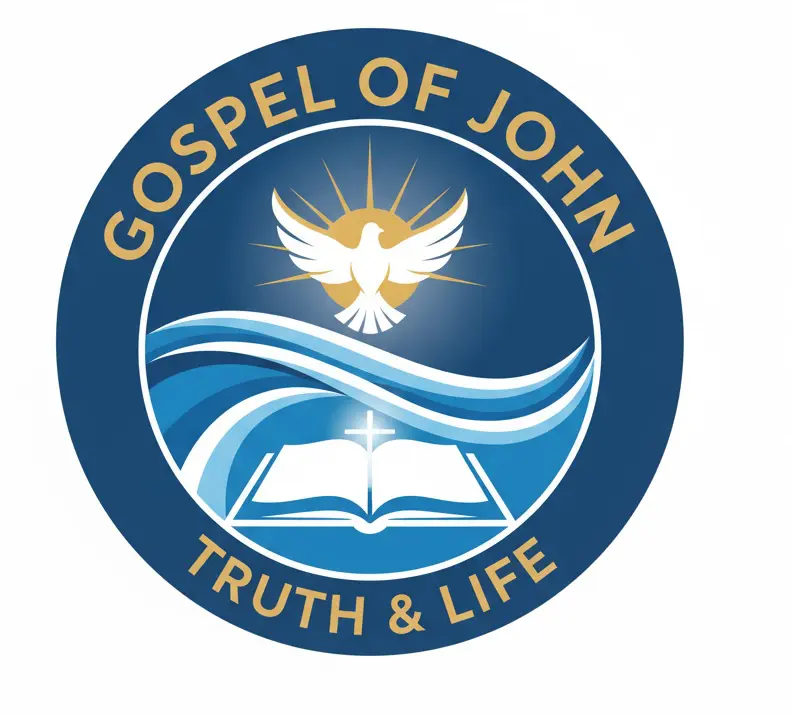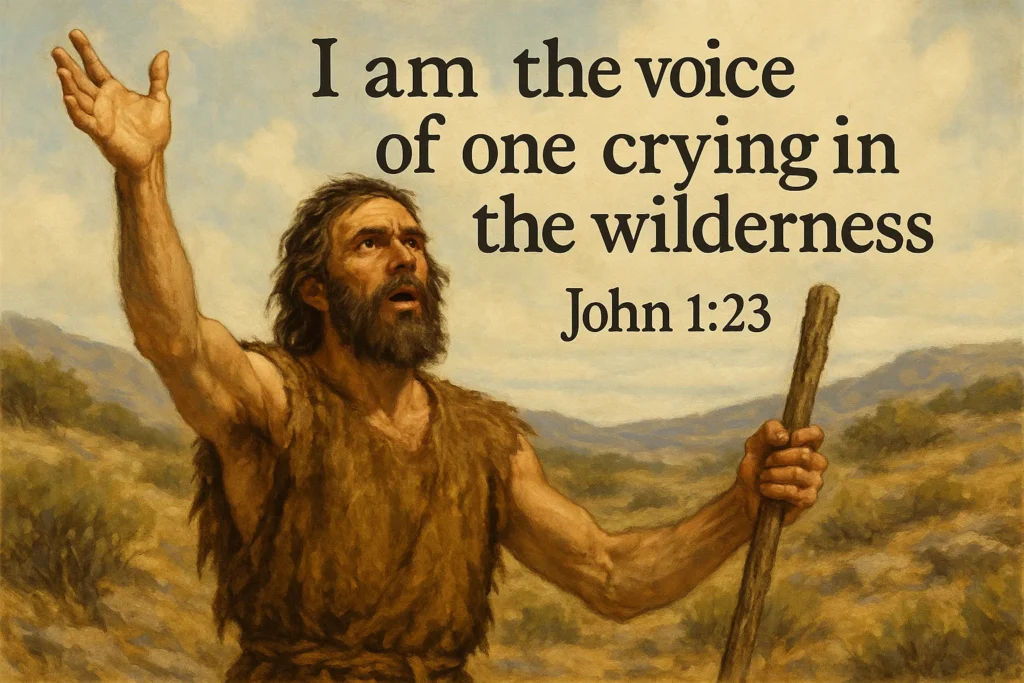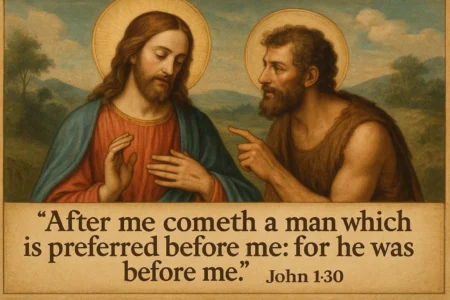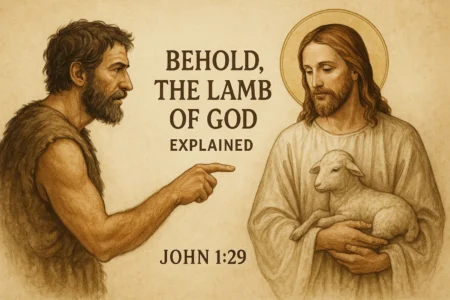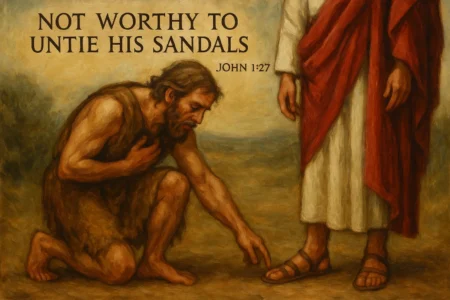Ever felt truly, deeply lost? I’m not talking about just missing a highway exit. I mean that hollow, sinking feeling of being adrift. Lost in the “wilderness” of your own life. You’re not sure what’s next, and you’re just praying for a sign, any sign. A clear voice to cut through all that internal static. I’ve been there. More times than I’d like to admit.
It’s in those moments, isn’t it? A simple verse from the Bible stops being just words on a page. It becomes a kind of lifeline. For me, John 1:23 is one of those.
Picture the scene. The religious leaders, just radiating authority and skepticism, march out and demand to know who John the Baptist thinks he is. He doesn’t give them a name. He doesn’t hand over a resume. He gives them a purpose.
He says, “I am the voice of one crying out in the wilderness, ‘Make straight the way of the Lord,’ as the prophet Isaiah said.”
That answer. It’s packed with history, with identity, and with a radical call to action. It still gives me chills. But what is the real John 1:23 meaning? Why pull that specific quote? What could a voice yelling in a desert possibly have to do with us today, living in a world of endless noise?
Turns out, it has everything to do with us. This isn’t just a stale breakdown of an ancient verse. It’s a map. It’s an exploration of the practical, life-changing truth it holds for finding our own way.
More in John Chapter 1 Category
Key Takeaways
- He’s the Guy from the Prophecy: The “John 1:23 meaning” is John’s way of saying, “You know that prophecy from Isaiah 40:3? I’m him.” He’s the herald, the one sent to officially announce that God (the “Lord”) was about to arrive.
- Purpose Over Position: John the Baptist defines himself by his job, not his name. He’s the “voice.” This is a massive statement of humility. He’s pointing everyone away from himself and toward Jesus, who is the “Word” (John 1:1).
- The “Wilderness” Is a Vibe, Not Just a Place: The wilderness isn’t just sand and rocks. It’s a symbol. It’s the place you go for spiritual prep, for testing, for clarity. It’s where you get away from the “noise” and corruption of regular society.
- Get Ready. Seriously. “Make straight the way” is a command. It’s construction talk. Think “fill the valleys, level the hills.” John uses this to describe repentance—clearing out the junk in our hearts (sin, pride, hypocrisy) so we’re ready to actually meet God.
Who Exactly Was This “Voice”?
Before we can really get the quote, we have to get the man. Who was this guy, John the Baptist?
The scene in John 1 is just buzzing with tension. The religious VIPs from Jerusalem—the priests, the Levites, the “experts”—they all hiked out to the middle of nowhere to check out this rogue preacher. This wasn’t a friendly hello. They were auditing him. This guy was baptizing people, pulling in huge crowds, and preaching a raw, fiery message about repentance. He was doing all of this completely outside their official system.
So they pepper him with questions. “Who are you?” “Are you the Christ?” (The Messiah). “Are you Elijah?” (The great prophet who was supposed to return). “Are you the Prophet?” (The one Moses promised).
To every single one, John gives a short, sharp “No.”
He flat-out refuses every big title they try to stick on him. He’s not the main event, and he knows it. This is staggering. We live in a world where everyone is trying to build a brand, be somebody, get the spotlight. John had a massive spotlight on him and actively tried to push it away.
Finally, his questioners are just fed up. “Who are you? Give us an answer to take back to those who sent us. What do you say about yourself?” (John 1:22).
This is it. This is his moment. He could have given his name. He could have mentioned his impressive family tree (his dad was the priest Zechariah). Instead, he gives them his purpose.
“I am the voice…”
By quoting Isaiah, John does something unbelievably bold. He’s telling these religious scholars, “You know your own scriptures? You’ve been waiting for the guy Isaiah talked about? The one who announces the King’s arrival? That’s me.” He was the opening act. He was the guy sent ahead to clear the road because someone impossibly important was right behind him.
Why Did John Quote Isaiah?
John’s choice of Isaiah 40:3 wasn’t just him pulling a random “wilderness” quote out of a hat. For the Jewish people, this specific verse was absolutely dripping with hope.
To get the full John 1:23 meaning, you have to rewind about 800 years to Isaiah. The prophet first spoke those words to a nation that was broken. The people of Judah were captives in Babylon. Their city was gone, their temple destroyed. They were hopeless. They were, in every sense, in a “wilderness” of despair.
And right into that darkness, Isaiah speaks this incredible word of comfort: “Comfort, comfort my people, says your God.” (Isaiah 40:1). The very next lines paint the picture of how this comfort would come. “A voice cries: ‘In the wilderness prepare the way of the LORD; make straight in the desert a highway for our God.'” (Isaiah 40:3).
This was a promise. God himself was coming to rescue his people. His glory would be revealed. Everyone would see it. This was the ultimate “good news.”
So, when John the Baptist grabs this ancient prophecy and wraps it around himself, he’s making a claim that would have rocked their world. He’s saying, “All that waiting? It’s over. The rescue mission Isaiah promised? It’s starting. Right now. God is on the move, and I’m the one telling you to get ready.”
It’s just… wow. It reminds me of something much smaller in my own life. When my dad passed away, he left a woodworking project half-finished. It was a big, intricate bookshelf we had designed together. For years, it just sat in my garage, a heavy symbol of everything left undone. Finally, I spent six solid months teaching myself the joinery, finding the right wood, and finishing it. The day I put that last coat of varnish on, I wasn’t just a guy building a shelf. I was completing a story. I was making good on a promise. I was making something “straight” that had been crooked for too long.
John was doing that, but on a cosmic scale. He was stepping into history to fulfill a divine promise, to finish a story God had started centuries before.
What’s the Big Deal About the “Wilderness”?
It’s easy to hear “wilderness” and just think “desert.” Sand. Scorpions. Emptiness. A desolate, useless place. But in the Bible, the wilderness (midbar in Hebrew) is so much more than that. It’s a place absolutely loaded with spiritual meaning.
The wilderness is never just a backdrop; it’s a character in the story.
- It’s a Place of Testing: This is where the people of Israel wandered for 40 years. They were tested, purified, and had to learn to depend on God for everything—from their daily bread to their water.
- It’s a Place of Refuge: This is where David ran from King Saul. It was dangerous, sure, but it was also a sanctuary where he was protected and where he wrote so many of the Psalms.
- It’s a Place of Revelation: This is where Moses saw the burning bush. It’s where Elijah fled to hear God’s “still, small voice.”
The wilderness is the opposite of the city. It’s the opposite of the Temple in Jerusalem, which by John’s time had become, for many, a place of rigid rules, politics, and hollow religion.
John is preaching in the wilderness on purpose. He is deliberately stepping outside the compromised religious system. He’s calling people to walk out of their comfortable, noisy, hypocritical lives and into a place of raw, brutal honesty.
The wilderness is where all your illusions get burned away. There’s no fancy architecture. No complicated rituals. No social ladder to climb. It’s just you, your “crooked” life, and the voice of God. It’s the place you go to get real. It’s the quiet, uncomfortable place where you can finally, finally hear the truth.
“Make Straight the Way of the Lord”? What Does That Even Mean?
This right here is the core of the John 1:23 meaning. This is the “what to do” part. “Make straight the way of the Lord.”
What does that actually mean?
John was using an image that everyone in his day would have gotten instantly. In the ancient world, when a king or some other VIP was planning to visit a town, a herald was sent ahead. That herald’s job was to command the locals to literally “make the road straight.”
This was a massive civil engineering project.
- Valleys and potholes? You filled them in.
- Hills and high spots? You leveled them.
- Crooked, winding paths? You made them straight.
The goal was simple: create a smooth, direct, easy path for the king’s chariot. It was a sign of respect, and it was also just practical.
So, how does this work spiritually?
John takes this very physical, dirty-hands image and turns it into a powerful spiritual metaphor. He’s not telling people to grab shovels. He’s telling them to fix their hearts.
The “way of the Lord” is the path God uses to enter our lives. And John is saying that for most of us, that path is a total wreck. It’s blocked, it’s crooked, it’s a mess.
- The “valleys” that need filling? That’s the empty stuff. Our lack of faith, our apathy, our despair.
- The “mountains and hills” that have to come down? That’s our pride. Our arrogance. Our self-sufficiency. That stubborn part of us that whispers, “I got this. I don’t need God.”
- The “crooked paths” that need straightening? That’s our dishonesty. Our hypocrisy. The “double lives” we lead. All the little ways we compromise our integrity.
To “make straight the way” is the work of repentance. It’s the hard, messy, absolutely necessary job of clearing all that junk out of our souls.
Was John’s Message Just for His Time?
This call to get ready? It’s timeless. We all have our own “crooked paths” to deal with.
I remember a few years back, my relationship with my younger brother was a disaster. We hadn’t had a real conversation in months. It was just a cold war of angry texts. And all of it started from a stupid argument about family money that just spiraled. That was a “crooked path” in my life. It was a place of deep pride and dishonesty for both of us.
Making it “straight” was one of the hardest things I’ve ever done. It meant swallowing my pride—a mountain of it—and making that first phone call. It meant apologizing for my part, with zero guarantee he’d apologize for his. It was like taking a spiritual shovel to that mountain of my own self-righteousness. That’s the kind of gut-level, heart-pounding preparation John was talking about. It’s not a tidy little prayer. It’s the hard work of leveling our own pride and filling in the potholes of our broken relationships.
Why Didn’t John Just Say “I’m John”? Why So Cryptic?
This, for me, is one of the most challenging and beautiful parts of the John 1:23 meaning.
Think about it. John had a great identity. He was John, son of Zechariah, from a priestly family. That was a very respectable title in his day. But he refuses it.
He doesn’t define himself by who he is. He defines himself by his relationship to someone greater.
He is the “voice.”
Later in this same Gospel, Jesus is called the “Word” (John 1:1, 1:14 – “In the beginning was the Word… and the Word became flesh”). This distinction is everything.
A “word” is the message itself. It’s the substance, the meaning, the person. A “voice” is just the delivery system. The voice is the vibration in the air that carries the word. A voice is temporary. It makes its sound, and then it’s gone. The word it carried is what lasts.
John the Baptist is the ultimate example of humility. His entire purpose, as he says later, was to “decrease” so that Jesus could “increase” (John 3:30). He was the best man, not the groom. He was the voice, not the Word. He was the road-prepper, not the King.
This is a profound challenge to our culture. We are obsessed with building our “personal brand,” our platform, our legacy. We want our voice to be the one that’s heard and liked and shared. John’s life shows a completely different way. It teaches that real greatness isn’t found in pointing to ourselves. It’s found in pointing to something—and someone—greater. His whole identity was his mission: get the way ready for Jesus.
How Does the “John 1:23 Meaning” Fit with the Other Gospels?
The Gospel of John is unique in many ways, but on this point, it’s in perfect harmony with the other accounts of Jesus’s life (Matthew, Mark, and Luke).
- Matthew 3:3 quotes Isaiah 40:3, and flat-out identifies John as “the voice of one crying in the wilderness: ‘Prepare the way of the Lord; make his paths straight.'”
- Mark 1:3 does the exact same thing. He uses the Isaiah quote as the grand opening for his whole Gospel, setting the stage for John’s ministry.
- Luke 3:4-6 also uses the Isaiah 40 quote, but he actually makes it longer. He includes the parts about valleys being filled and mountains being made low, really hammering home that John’s message was about radical, society-shaking change.
This unanimous testimony is powerful. The earliest Christians were all on the same page: John the Baptist was the one. He was the prophesied forerunner. The “John 1:23 meaning” isn’t some throwaway idea in one book. It’s a foundational truth for the entire New Testament. The story of Jesus begins with this voice, crying out in the wilderness, demanding that the world get ready.
Finding Our Own “Wilderness” Today
So, what do we do with this? We live in a world that is the total opposite of the wilderness. We live in a world of constant noise.
Our phones buzz. Emails pile up. Social media feeds scream for our attention. The “voices” are deafening. And most of them are telling us to buy more, be more, and do more.
If the wilderness is the place where we can finally hear the truth, then we have to create our own.
For you, a “wilderness” might be:
- The first 15 minutes of the morning with a cup of coffee, before you look at a single screen.
- A long walk in a park, intentionally leaving your headphones at home.
- The simple act of journaling, just to get your own chaotic thoughts out of your head and onto paper.
- A “digital sabbath” for a few hours every week, where the phone and computer are just… off.
It’s any place or practice where you can quiet the external noise long enough to hear the internal truth. It’s in that quiet space that we can finally start to do the hard work John talked about.
What “crooked paths” do we need to straighten?
That “road work” is still our job. This idea of self-examination and preparation is a core part of spiritual traditions all over the world. As scholars at places like Harvard Divinity School often discuss, the “wilderness” is a timeless archetype for spiritual transformation.
It means we have to ask ourselves the hard questions.
- Where is my pride (my “hill”) causing a roadblock in my relationship with my spouse, my kids, or my colleagues?
- What “valley” of apathy or fear is keeping me from stepping into the life I’m called to?
- Where am I living a “crooked” life, saying one thing but doing another?
This isn’t about beating ourselves up. It’s about maintenance. It’s the honest, grown-up work of “clearing the road” so that God—whatever form that takes for you: peace, truth, love, purpose—can have a smooth path to travel into your life.
The Voice That Still Echoes
The “John 1:23 meaning” is so much more than a dusty historical fact. It’s a living invitation.
It’s an invitation to find our own wilderness, to intentionally step away from the distracting, deafening noise of the world.
It’s a challenge to our identity. It asks if we’re brave enough to be a “voice” that points to a truth greater than ourselves, rather than just building a “brand” that points back to us.
And most of all, it’s a practical, hands-on call to action. It’s a call to grab a spiritual shovel and get to work on our own hearts. To level the mountains of our pride and straighten the crooked paths of our integrity.
John’s voice was temporary. His message, however, echoes through eternity:
Get ready. The King is coming.
Make the way straight.
FAQ
Why did John the Baptist choose to identify himself as ‘the voice’ rather than using his name or titles?
John identified himself as ‘the voice’ to emphasize humility and to point away from himself toward Jesus, highlighting that his role was to prepare the way for the greater Christ.
What does ‘making straight the way of the Lord’ mean practically in our lives today?
Practically, it involves the process of repentance—removing pride, dishonesty, and other barriers in our hearts—to create a clear and direct path for God’s influence in our lives.
What is the spiritual meaning of the ‘wilderness’ in John 1:23?
The wilderness represents a place of testing, refuge, and revelation—an environment where one can strip away illusions, confront the truth, and undergo spiritual transformation away from societal hypocrisies.
How can modern believers find their own ‘wilderness’ to hear God’s voice amid today’s noise?
Believers can create their own wilderness through quiet practices like morning reflection, walks without distractions, journaling, or digital sabbaths, allowing them to disconnect from external noise and hear their inner truth.
